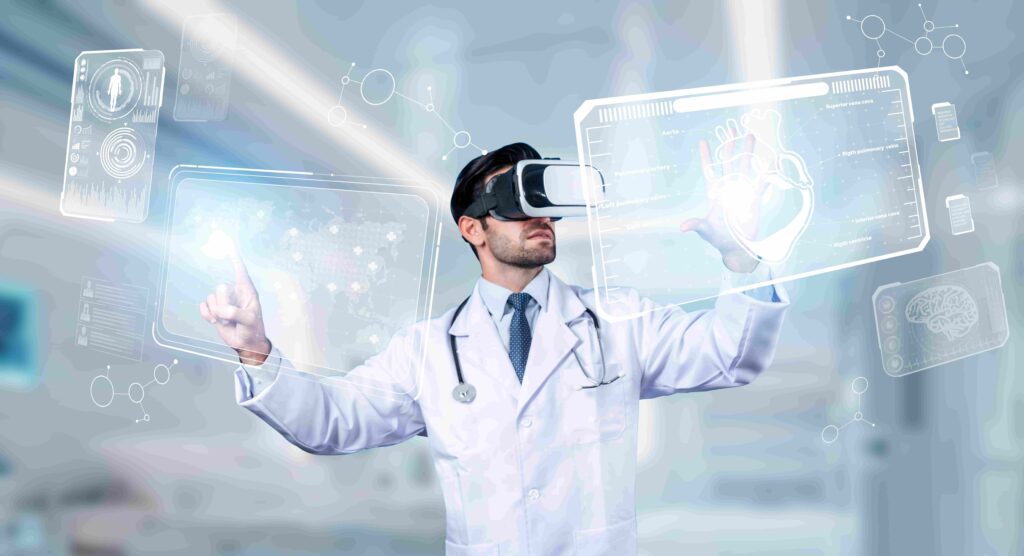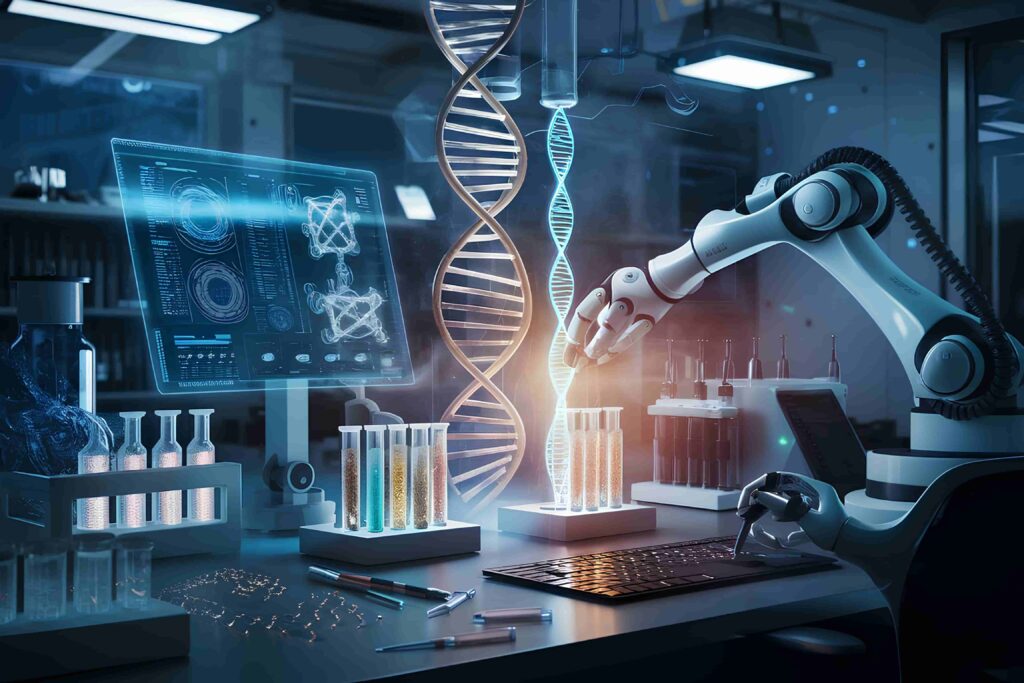Discover how technological advances are transforming healthcare

Medicine is undergoing a revolution. Treatments that were once generalized and did not always work for everyone are being replaced by highly personalized approaches.
This change is driven by precision medicine, which uses technology to understand and treat each patient as a unique individual.

Productivity Apps
Discover the best productivity apps, essential features and trends that are transforming productivity!
Combining advanced tools such as artificial intelligence, big data and gene editing, personalized medicine promises faster diagnoses, more effective therapies and ongoing care based on each person's genetic profile, medical history and lifestyle.
This article details how technology is transforming the healthcare landscape and the challenges of making this approach accessible to everyone.
What is Precision Medicine?
Precision medicine is a medical approach that considers each individual's genetic, environmental and lifestyle differences.
Unlike traditional medicine, which applies generic treatments to all patients with the same condition, precision medicine seeks to create specific therapies for each person.
For example, in cancer treatment, conventional medicine may prescribe chemotherapy for all cases, while precision medicine identifies specific genetic mutations in the tumor to target treatments that are more effective and less aggressive.
This approach is driven by advances such as genomic sequencing, which rapidly analyzes patients' DNA, and big data, which processes vast amounts of data to find patterns and propose solutions.
With precision medicine, the future of healthcare is bright and patient-centered.
Technological Advances That Are Transforming Precision Medicine
Precision medicine only became a reality thanks to technological advances that allowed a deeper understanding of human biology and the creation of tools to personalize treatments.
Genomic sequencing, artificial intelligence (AI), big data and biotechnology are just some of the innovations that are shaping this new era in healthcare. These advances offer faster diagnoses, effective therapies and more person-centered care.
Genomic Sequencing
Genomic sequencing is one of the main pillars of precision medicine. It enables detailed DNA analysis, allowing the identification of genetic mutations associated with diseases.
How it works:
- With technologies like Next Generation Sequencing (NGS), it is possible to quickly map billions of bases of human DNA.
- Once expensive and time-consuming, the process is now affordable. Today, it is possible to sequence a complete genome in days, at reduced costs.
Impact on Precision Medicine:
- Early Detection: Genomic sequencing makes it possible to diagnose genetic diseases in the early stages, when there is still a greater chance of intervention.
- Personalized Treatment: It identifies specific mutations in tumors, helping doctors choose targeted therapies that directly attack diseased cells.
- Prevention: It reveals genetic predispositions to conditions such as breast cancer, Alzheimer's and diabetes, allowing for personalized preventive actions.
Practical Example:
In lung cancer patients, sequencing can identify the presence of mutations in the EGFR or ALK genes. This allows doctors to choose drugs that inhibit these specific mutations, rather than resorting to generic chemotherapies.
Big Data and Data Analysis
Big data plays a central role in precision medicine by integrating and analyzing large volumes of genetic, clinical and environmental data. It helps identify patterns that guide personalized diagnoses and treatments.
How it works:
- Data Collection: Genetic information, electronic medical records, data from wearables and clinical trials are collected on a massive scale.
- Advanced Analysis: Big data algorithms analyze this data to identify correlations between genes, behaviors, and responses to treatments.
Benefits of Big Data:
- Evidence-Based Diagnostics: Data from patients around the world allows us to identify rare genetic variations and their implications.
- Risk Forecast: Predictive models analyze a patient's health history and habits to predict their risk of developing conditions like diabetes or heart disease.
- Clinical Research Support: Big data analysis accelerates the identification of targets for new drugs, reducing the time to develop therapies.
Practical Example:
In the treatment of heart disease, big data algorithms can integrate blood pressure, heart rate and family history data to predict the risk of heart attacks, enabling early interventions.
Artificial Intelligence (AI)
Artificial intelligence (AI) is one of the most powerful tools in precision medicine. It combines machine learning and predictive analytics to deliver faster diagnoses and personalized therapies.
AI Applications:
- Medical Image Analysis:
- AI tools analyze images from X-rays, CT scans, and MRIs to identify anomalies with greater accuracy.
- Impact: In oncology, AI detects tumors at early stages that might otherwise go unnoticed by doctors.
- Treatment Planning:
- AI-based systems suggest personalized treatments based on the patient's genetic profile and history.
- Example: Algorithms indicate which drugs are most likely to be successful in patients with triple-negative breast cancer.
- Epidemic Forecast:
- By analyzing public health data and mobility patterns, AI predicts infectious disease outbreaks, enabling faster responses.
Advantages:
- Speed: Diagnoses that previously took weeks can now be performed in minutes.
- Precision: Reduces human error by delivering consistent, data-driven results.
Big Data Integration in Personalization of Therapies

The integration of big data into precision medicine is transforming how doctors and researchers analyze health information.
By collecting, organizing and analyzing huge volumes of data, big data enables more accurate diagnoses, personalized therapies and advances in disease prevention.
This data includes everything from genetic information to behavioral habits, allowing a holistic view of each patient's health.
Data Collection and Analysis
Health data collection occurs at multiple levels and is critical to personalizing therapies.
- Electronic Medical Records (EMRs): They store the patient's health history, including previous diagnoses, medications and treatments.
- Genomic Banks: They gather genetic information from entire populations to identify common and rare genetic mutations.
- Connected Devices: Wearables and sensors generate real-time data on health conditions such as heart rate and blood glucose levels.
This data is stored in integrated systems, which make it accessible for analysis by doctors and researchers.
Practical Application Example:
A breast cancer patient can have their genetic profile analyzed to predict how they will respond to different chemotherapy treatments. This process prevents failed attempts and saves valuable treatment time.
Big data, combined with artificial intelligence, is also being used to predict outbreaks of infectious diseases, allowing governments to take preventive measures.
Practical Applications in Personalized Medicine
Personalized medicine is transforming healthcare, enabling more accurate diagnoses and treatments tailored to the individual characteristics of each patient.
Unlike the traditional approach, where the same treatment is applied to everyone, personalized medicine uses genetic data, medical history and lifestyle information to create unique solutions.
This approach has revolutionized several areas of medicine, bringing benefits to both patients and healthcare professionals. Below, we explore the main practical applications of personalized medicine.
Precision Oncology
Cancer treatment is one of the most advanced areas in personalized medicine. Thanks to tools such as genome sequencing and artificial intelligence, it is possible to create therapies that attack specific genetic mutations in the tumor, sparing healthy tissue and reducing side effects.
Main Applications:
- Targeted Therapies: Treatments developed to target specific molecular alterations, such as the use of drugs that block mutations in the EGFR gene in lung cancer.
- Personalized Immunotherapy: It stimulates the patient's immune system to recognize and destroy cancer cells. This approach is tailored to each individual, increasing its effectiveness.
- Early Detection: Tools such as liquid biopsies detect fragments of tumor DNA in the blood, allowing for earlier diagnoses and more effective treatments.
Rare Diseases
Patients with rare genetic diseases often face delayed diagnoses and limited treatment options. Personalized medicine is changing this by identifying specific genetic mutations and creating tailored therapies.
Impact:
- Faster Diagnostics: Tools such as exome sequencing allow us to identify mutations in rare genes that cause inherited diseases.
- Gene Therapies: They directly correct mutations responsible for diseases. For example, the use of Zolgensma to treat spinal muscular atrophy (SMA) in children.
- Improving Quality of Life: Previously unassisted patients now have access to effective treatments, reducing symptoms and complications.
- Example: Gene therapies like Zolgensma treat spinal muscular atrophy by correcting defective genes.

Best Offline Maps and Navigation Apps
Find the best offline maps and navigation apps to explore the world without the internet. Safety, savings and convenience!
Pharmacogenomics
Pharmacogenomics is the study of how genes affect a patient's response to medications.
Based on genetic testing, doctors can adjust the choice and dosage of medications to maximize effectiveness and minimize side effects.
Benefits:
- Reduction of Adverse Reactions: Avoid the use of medications that may cause negative reactions based on the patient's genetic profile.
- Optimized Choice of Treatments: It helps determine which medications have the best chance of success for each individual.
- Treatment Efficiency: Reduces trial and error time, speeding up recovery.
The Role of Artificial Intelligence (AI) in Diagnosis and Treatment
Artificial intelligence (AI) is playing a transformative role in the field of medicine, especially in precision medicine and personalized therapies.
By analyzing vast amounts of data and identifying patterns that often escape the human eye, AI is helping to create faster diagnoses and highly effective treatments tailored to each patient’s individual needs.
Diagnostic Imaging
One of the main applications of AI in medicine is the analysis of medical images. Advanced algorithms can interpret X-rays, CT scans, MRIs and other exams with greater accuracy than human experts in some situations.
Benefits:
- Early Detection: Identification of tumors in early stages, before they are detectable by conventional methods.
- Error Reduction: AI eliminates errors caused by human fatigue or distraction, offering greater consistency in results.
Practical Example:
In breast cancer diagnosis, AI tools analyze mammograms to identify microcalcifications that may indicate the onset of the disease, with accuracy rates above 90%.
Personalized Treatment Planning
AI is crucial for analyzing a patient’s genomic and clinical data, suggesting personalized therapies that increase the chances of success and minimize side effects.
How it works:
- AI algorithms analyze the patient's DNA, medical history, and response to previous treatments.
- Based on this data, AI recommends medications or procedures tailored to the individual profile.
Example:
Lung cancer patients who have mutations in the EGFR gene can be treated with tyrosine kinase inhibitors, identified by AI analysis, which significantly increase the success rate of treatment.
Gene Editing Technologies: The Future of Personalized Medicine
Gene editing is revolutionizing precision medicine, allowing treatments to be tailored to the genetic root cause of diseases.
Tools like CRISPR-Cas9 have opened up new possibilities by enabling precise changes to human DNA.
This technology transforms the way complex, inherited diseases are treated, prevented and, in some cases, potentially eliminated.
What is Gene Editing?
Gene editing is a DNA modification technique that allows the direct manipulation of genes in an organism. It can be used to:
- Correct mutations responsible for inherited diseases.
- Turn off genes that cause health problems.
- Insert new genes that provide resistance to specific conditions.
The best known tool is the CRISPR-Cas9, which works like “molecular scissors”. It locates a specific stretch of DNA and cuts it, allowing the precise editing of defective genes or the insertion of correct sequences.
How does CRISPR work?

CRISPR has become the leading gene editing technology due to its precision, efficiency and flexibility.
How CRISPR works:
- Gene Identification: CRISPR is programmed to target a specific sequence in the genome.
- DNA Cut: The Cas9 enzyme cuts the identified section.
- Repair or Replacement: The cell repairs the cut DNA, allowing the correction of mutations or the insertion of new genes.
Medical Applications:
- Correction of Hereditary Diseases: Corrects mutations that cause conditions such as sickle cell anemia and cystic fibrosis.
- Oncological Therapies: It uses CRISPR to modify immune cells, such as T cells, so that they fight tumors more effectively.
- Eradication of Infectious Diseases: The use of CRISPR to remove the DNA of viruses, such as HIV, from infected cells is being studied.
Practical Example:
Patients with beta-thalassemia, a genetic condition that affects hemoglobin production, are being treated with gene editing to correct the disease-causing mutation.
Applications of Gene Editing in Personalized Medicine
Gene editing is playing a central role in gene therapies, which aim to correct or replace defective genes to treat diseases at their root.
Main Areas of Application:
- Monogenic Diseases:
- Diseases caused by mutations in a single gene, such as Duchenne muscular dystrophy and hemophilia, are ideal targets for gene editing.
- Example: Zolgensma gene therapy corrects mutations that cause spinal muscular atrophy (SMA).
- Cancer:
- CRISPR is being used to edit immune system cells so that they recognize and destroy cancer cells.
- Example: Genetically modified T cells have been used in clinical trials to treat leukemia that is resistant to other treatments.
- Infectious Diseases:
- Research is exploring the removal of viral DNA from infected human cells. This includes using CRISPR to eliminate HIV from the human genome.
Ethical Challenges and Issues
Despite its potential, gene editing faces technical, financial and social barriers.
Technical Challenges:
- Off-Target Editions: Small mistakes can alter incorrect genes, resulting in dangerous mutations.
- Variable Efficiency: Not all edited cells retain the desired changes, reducing the effectiveness of the treatment.
High Costs:
Gene-editing therapies are still extremely expensive, making them inaccessible to a large part of the population.
Regulations:
Gene editing needs strict regulation to ensure safety and ethical use, especially in therapies that involve modifications to embryos.
Wearables and Continuous Health Monitoring
Wearable devices have played a key role in precision medicine, enabling real-time monitoring of patients' health.
These devices collect continuous data that helps in early detection of problems and adjusting treatments.
Examples of Wearables and Their Applications:
- Smartwatches and Smart Bracelets:
- They monitor heart rate, blood oxygen levels, sleep patterns and physical activity.
- Some models already detect cardiac arrhythmias, such as atrial fibrillation, before serious symptoms appear.
- Continuous Glucose Sensors:
- Used by diabetics to track glucose levels in real time, avoiding hypoglycemia or hyperglycemia crises.
- Respiratory Monitoring Devices:
- They help monitor conditions such as sleep apnea and asthma.

Financial Control Apps
Discover how financial control apps help you organize expenses, create goals and plan your budget in a practical and efficient way.
Benefits of Wearables in Personalized Medicine:
- Proactive Prevention: The captured data helps identify early abnormalities, allowing doctors to adjust therapies before a patient’s condition worsens.
- Individualized Monitoring: Each patient is continuously monitored, ensuring that treatments are adjusted according to their specific response.
Impact on Daily Life:
A patient with heart failure, for example, could wear a wearable that warns of dangerous changes in heart rate or blood pressure, allowing for rapid interventions.
With advances in sensor and connectivity technology, wearables are becoming an essential tool for integrating everyday data into personalized medicine.
Ethics and Privacy in the Use of Data for Personalized Medicine
While precision medicine brings enormous benefits, the use of genetic and medical data on a large scale raises ethical and privacy issues that need to be addressed seriously.
Main Ethical Concerns:
- Data Storage and Security:
- Genomic data is extremely sensitive. A leak could expose information about genetic predisposition to diseases, which could be used in discriminatory ways in health insurance or in the job market.
- Informed Consent:
- Patients must be completely clear about how their data will be used and who will have access to it.
- Equity in Access:
- The high cost of technologies can create inequalities in access to personalized treatments, favoring only wealthier populations.
Measures to Ensure Ethics and Privacy:
- Laws and Regulations:
- The LGPD (General Data Protection Law) in Brazil and the GDPR in the European Union ensure that patient data is used ethically and securely.
- Transparency:
- Healthcare institutions must inform patients about how their data will be used, offering options for explicit consent.
- Secure Storage:
- Technologies such as blockchain can be used to protect genetic data from unauthorized access.
Balancing innovation and ethical responsibility is essential to ensure that advances in personalized medicine benefit society as a whole.
Challenges of Implementing Precision Medicine

Although promising, precision medicine faces several challenges for its widespread implementation.
1. High Costs:
- Genomic sequencing and personalized therapies still have high prices, making them inaccessible to many patients.
- Government programs and subsidies are needed to democratize access.
2. Data Integration:
- Healthcare systems often use incompatible IT platforms, making it difficult to integrate genomic, clinical and environmental data into a single database.
3. Professional Training:
- Many physicians and healthcare professionals are not yet prepared to interpret genomic data or use advanced technologies in diagnosis and treatment.
How to Overcome These Obstacles:
- Public and Private Investments: To finance research and technological infrastructure.
- Multisectoral Partnerships: Collaborations between technology companies, governments and healthcare institutions can accelerate the implementation of affordable solutions.
- Medical Education: Specialized training in genomics and big data should be incorporated into the curriculum of medical schools and specialization courses.
Success Stories in Precision Medicine
The application of personalized medicine has already generated impressive results in several areas.
1. Oncology:
- Keytruda (Pembrolizumab): An immunotherapy that attacks tumors with specific genetic mutations, regardless of where the cancer originated.
- Impact: Significantly higher response rates in patients meeting genetic criteria for treatment.
2. Gene Therapies:
- Zolgensma: A single injection corrects genetic mutations in children with spinal muscular atrophy, offering quality of life and hope to families.
3. Pharmacogenomics in Psychiatry:
- Genetic testing helps identify the most effective antidepressants for each patient, reducing trial and error.
The Future of Personalized Medicine
With emerging technologies and increased data integration, the future of precision medicine is promising:
- Nanotechnology: Microscopic devices could deliver drugs directly to target cells.
- Preventive Therapies: Gene editing could eradicate inherited diseases even before birth.
- Global Accessibility: Initiatives to reduce costs will make these treatments available to vulnerable populations.
Conclusion:
Precision medicine is revolutionizing healthcare, allowing diagnoses and treatments to be tailored to the individual.
By combining cutting-edge technology and personalized care, it promises not only to save lives, but also to improve quality and longevity.
Continue reading: Technology and Education: How Schools Are Adapting to the Digital Age. Understand how digital transformation is shaping the classroom for the future.

Technology and Education
From gamification to blended learning, technology is redefining education. See how schools are adapting to the challenges and opportunities!
